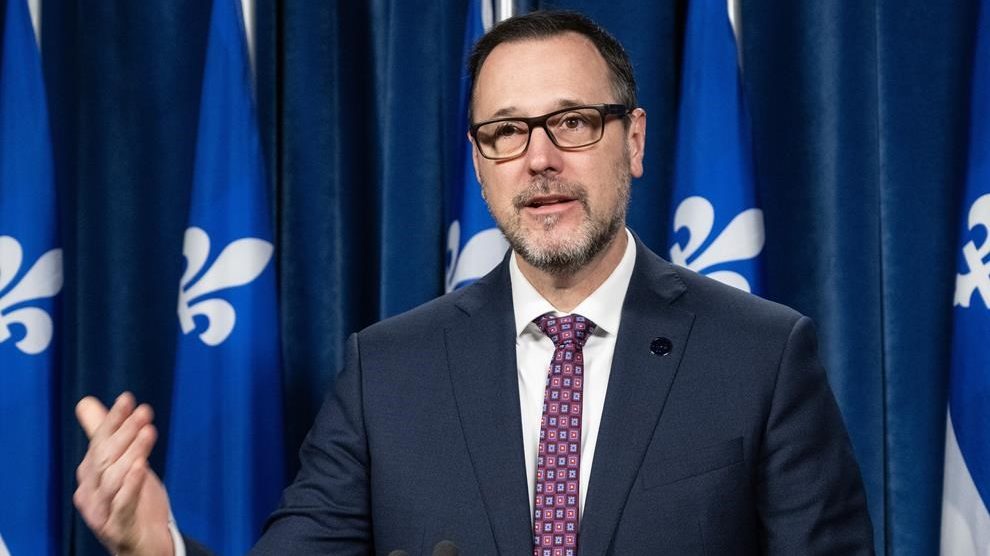
Quebec’s French language minister met with representatives of the English-speaking community on Tuesday to discuss concerns the province is restricting access to health care in English – but some vocal actors were missing from the discussion.
The meeting with Minister Jean-François Roberge was designed to hear concerns and reassure the community.
BACKGROUND: ‘You don’t have to show a certificate’: Quebec French language minister clarifies controversial directive
In an open letter published last week, the Quebec government attempted to quell concerns about the 23-page directive that was published last month, which sets out specific examples of situations where English can be used in health-care settings.
“The government of Quebec imposes absolutely no linguistic conditions in health-care settings before providing health care in English to anyone who requests it,” reads the letter signed by Roberge, Health Minister Christian Dubé, and Eric Girard, the minister responsible for relations with English-speaking Quebecers.
Of those three, only Roberge was expected at Tuesday’s meeting.
That was enough for the Quebec Community Groups Network (QCGN), which represents English speakers in the province, to reject the government’s late invite to the discussion. The QCGN had not been invited until Tuesday itself.
“We maintained what we have said: it is essential that Health Minister Christian Dubé be present, and the QCGN is prepared to wait until he is before engaging with the government directly,” the QCGN told CityNews in a statement Tuesday. “On July 29, we asked Minister Dubé for a meeting and have yet to receive his response.”
The QCGN says it’s not the only group to reject the invite. “Because they share our view that the meeting should be with M. Dubé, the minister responsible for the administration of Health and Social Services in Quebec. M. Roberge does not play that role,” the QCGN said on Monday.
“The QCGN and others now ask these ministers to live up to that promise and meet with us for a full and frank discussion, as soon as possible.”
Quebec’s proposed health-care directive
The Quebec government’s directive suggests a language other than French should only be used in exceptional situations, when “health, public safety or the principles of natural justice require it,” including during emergencies.
It instructs health-care workers to always communicate in French first, and lists a number of highly specific examples where English can be used. In one, a 10-year-old boy requires emergency medical care. In that case, health-care professionals are allowed to ask for his anglophone father’s consent in English.
The directive also stipulates that members of Quebec’s historic anglophone community must provide a certificate proving their eligibility to attend English school in the province if they want to receive all medical services exclusively in English.
Roberge has previously claimed the directive “concerns the administration of the health care system” and not front-line health care, though that is not stated in the document.
WATCH: Quebec French language minister clarifying controversial directive
According to the directive, immigrants to the province are only eligible to receive health care in a language other than French for the first six months after their arrival.
“I would like to state in a very, very clear manner, without any ambiguity, that the Government of Quebec has not taken any action, and will not take any action, that calls into question the right of English speakers in Quebec to be welcomed, to be treated in the language of their choice, that is to say in English,” Roberge said last week.
‘Scrapped immediately and permanently’
The QCGN says Quebec’s directives must be “scrapped immediately and permanently,” not simply edited or amended.
“Piecemeal changes to these directives are not enough,” QCGN director-general Sylvia Martin-Laforge said in a press release after the meeting. “The problem is not that we don’t understand the directives – we very clearly do. The problem is in the government’s choice of priorities, which, to read the directives, lean to protecting a language first.
“At the very least, if the directives are to be edited, the current, unacceptable directives must be suspended immediately, this minute. The confusion they create, the complications they introduce into the administration of health care in Quebec are unnecessary and unconscionable.”
–With files from The Canadian Press